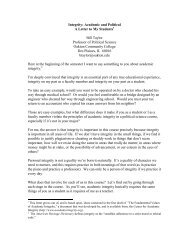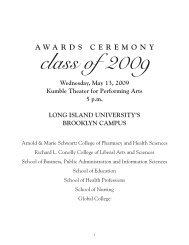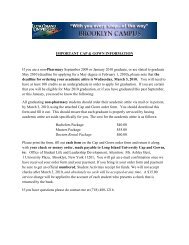united nations advanced certificate faculty - Long Island University
united nations advanced certificate faculty - Long Island University
united nations advanced certificate faculty - Long Island University
You also want an ePaper? Increase the reach of your titles
YUMPU automatically turns print PDFs into web optimized ePapers that Google loves.
As a Commission Secretary of the Population Commission (1964-1974), what were your<br />
duties? Were you involved in the preparation of the Annual Commission and/or the Annual<br />
Report?<br />
Of course. I had to prepare the Draft Agenda from A to Z and follow up with the election of officers,<br />
i.e., a chairman, vice chairman and rapporteur. At that time, the GA was gradually showing<br />
an interest in population matters, particularly at its 21 st session. The UN had always been a bit<br />
reluctant to adopt population action programs, as these would imply advising governments on the<br />
implications of rapid population growth in the areas of economic and social development. And<br />
these programs frequently raised controversial and sensitive issues. Eventually, the GA recognized<br />
their importance, so the Population Commission was charged to formulate policy and design programs<br />
in the areas of fertility, mortality, migration, and population structure. All this led to the<br />
1974 World Population Conference in Bucharest, the first UN intergovernmental population conference<br />
to adopt an action program.<br />
Have there been significant changes in the work of the Population Commission, either in<br />
procedural or substantive manners, from the years of your tenure until now?<br />
Yes. Around 1960, the growth rate of the world population peaked. In response, the UN worked<br />
to develop and implement impartial and scientifically correct population policies that would be<br />
suitable for member states. Also, member states sought advice from the UN on how to formulate<br />
population policies that would be suitable to their own countries, considering their particular<br />
social, economic and cultural realities. Therefore, the Population Commission was very much<br />
involved in preparing draft resolutions for ECOSOC and the GA on those issues. At the same<br />
time, there was a proposal by some member states (Denmark, the US, Japan) to create a fund for<br />
population programs, based on voluntary contributions, since the UN budget was already allocated<br />
to other areas. That’s how and why the UN Population Fund (UNFPA) was created.<br />
During your career at the UN, what were the most relevant issues on population and migration?<br />
Did you have to deal with any of them, and if so, in what way?<br />
At the beginning, the UN suffered a big handicap in forecasting world population projections<br />
owing to methodology limitations. We tended to underestimate future world population growth,<br />
but gradually we improved the techniques and methodologies of the projections, which become<br />
increasingly exact over time. In a sense, the demographic projections were far more accurate compared,<br />
let’s say, to economic forecasting, which was a reason for us to be proud. Sometimes we<br />
used what we called stable population models, because in some developing countries breakdowns<br />
of fertility and mortality rates were not available. Another important task was carried out in cooperation<br />
with the Statistical Office where we encouraged all member states to participate in a World<br />
Population Census. Starting in 1980, and in cooperation with the Statistical Office, we have managed<br />
to have almost global coverage of the population. That provided a basis for accurate demographic<br />
interpretations for use in economic and social development planning. UNFPA has successfully<br />
attracted considerable financial support for this very expensive enterprise.<br />
7













